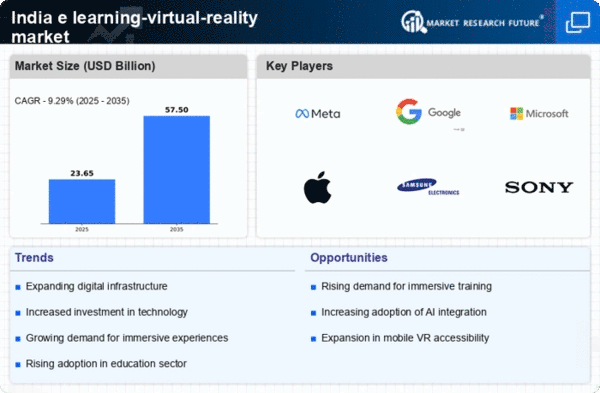Supportive Educational Policies
Supportive educational policies implemented by the Indian government positively impact the e learning-virtual-reality market. Initiatives aimed at promoting digital learning and technology integration in education are creating a conducive environment for the adoption of VR solutions. Policies that encourage the use of innovative teaching methods and the incorporation of technology in classrooms are likely to foster collaboration between educational institutions and VR developers. As a result, the e learning-virtual-reality market is expected to benefit from increased funding and resources allocated to enhance digital learning infrastructure. This supportive framework may lead to a more widespread acceptance of VR technologies in educational settings, further driving market growth.
Technological Advancements in VR
The e learning-virtual-reality market is experiencing a surge due to rapid technological advancements in virtual reality (VR) hardware and software. Innovations such as improved graphics, enhanced interactivity, and more affordable VR headsets are making immersive learning experiences more accessible. In India, the market for VR technology is projected to grow at a CAGR of approximately 30% over the next five years. This growth is driven by the increasing demand for engaging educational content that can cater to diverse learning styles. As educational institutions and corporate entities recognize the potential of VR to enhance learning outcomes, investments in VR technology are likely to increase, further propelling the e learning-virtual-reality market forward.
Increased Focus on Skill Development
An increased focus on skill development across various sectors in India benefits the e learning-virtual-reality market. With the rapid evolution of industries, there is a pressing need for continuous learning and upskilling. VR-based training programs are emerging as effective tools for skill enhancement, particularly in fields such as healthcare, engineering, and manufacturing. According to recent data, the Indian skill development market is anticipated to reach $30 billion by 2025, with a substantial portion allocated to innovative training solutions like VR. This emphasis on practical, hands-on learning experiences is likely to drive the adoption of VR technologies in educational and corporate training settings, thereby boosting the e learning-virtual-reality market.
Rising Demand for Personalized Learning
The rising demand for personalized learning experiences significantly influences the e learning-virtual-reality market. Learners in India are increasingly seeking tailored educational solutions that cater to their individual needs and preferences. VR technology offers the ability to create customized learning environments, allowing users to engage with content at their own pace. This trend is particularly evident in the growing popularity of adaptive learning platforms that utilize VR to provide personalized feedback and assessments. As educational institutions and training providers strive to meet this demand, the e learning-virtual-reality market is expected to expand, with a projected increase in user engagement and satisfaction.
Growing Internet Penetration and Smartphone Usage
Increasing internet penetration and smartphone usage in India will drive growth in the e learning-virtual-reality market. As of November 2025, approximately 700 million people in India have access to the internet, with a significant portion using smartphones for educational purposes. This accessibility facilitates the adoption of VR-based learning solutions, as users can engage with content anytime and anywhere. The proliferation of affordable smartphones equipped with VR capabilities is likely to enhance the reach of e learning-virtual-reality applications, making them more appealing to a broader audience. Consequently, this trend is expected to contribute to the expansion of the e learning-virtual-reality market in the coming years.

















